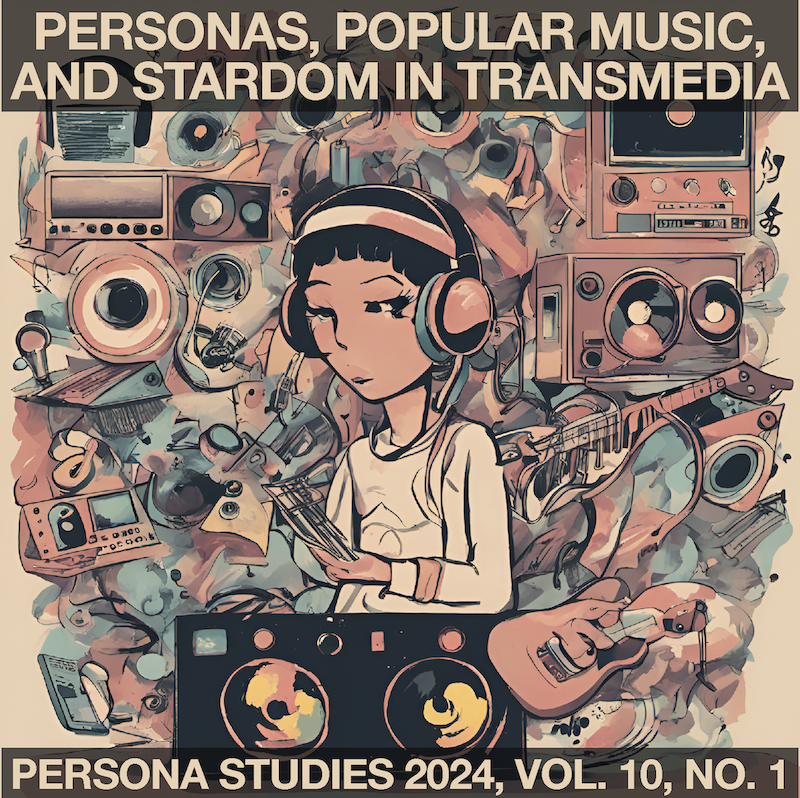"I Don't Feel Hate"
A Long Short TikTok Journey to the ESC 2021
DOI:
https://doi.org/10.21153/psj2024vol10no1art1871Keywords:
Stardom, Post-digital, Eurovision Song Contest, TikTok, Media HistoryAbstract
In (media) popular music, “personas” are usually media personalities. They mainly appear in mass media. As the media landscape has changed over the last 150 years, so have the media appearances of these musician-personalities - from sheet music to radio, records, film, television, music videos and finally YouTube, Instagram and TikTok. Popular music is dominated by stars, media personalities who present a musical performance - but the way this performance is presented has varied historically. In “old” media, record companies had considerable power with regard to access to markets, but also regarding production, marketing and perpetuation of star images. This has changed dramatically with the rise of the internet and various social media platforms. Now potentially everyone has access, everyone can present oneself publicly, everyone can have his or her “15 minutes of fame” (Andy Warhol). The article describes these transformations to the principle of stardom using a case study: the creation of the German entry for the Eurovision Song Contest in Rotterdam 2021. The previously unknown singer Jendrik Sigwart talks about his application on TikTok and in particular about the production of a music video for it. His application on TikTok for one of Europe’s oldest TV events is an interesting moment in media history, in which old narrative strategies mix with new ones.
Downloads
References
Abidin, C. 2020. ‘Mapping Internet Celebrity on TikTok: Exploring Attention Economies and Visibility Labours’, Cultural Science Journal, vol. 12, no. 1, pp. 77–103.
Albrecht, C. 2021, ‘Stummfilmästhetik auf TikTok – Attraktion und Narration’, 54 Books. 4 April 2021. <https://www.54books.de/attraktion-und-narration-aesthetiken-des-stummfilms-auf-tiktok>.
Cotter, K. (2019) ‘Playing the Visibility Game. How Digital Influencers and Algorithms Negotiate Influence on Instagram’, New Media & Society, vol. 21, no. 4, pp. 895–913.
Dreyer, C. & Triebel, C. 2011, Ein bisschen Wahnsinn. Wirklich alles zum Eurovision Song Contest. Kunstmann, München.
Feddersen, J. 2010, Wunder gibt es immer wieder. Das große Buch zum Eurovision Song Contest, Aufbau, Berlin.
Fischer-Lichte, E. 2005. ‘Inszenierung’, in E. Fischer-Lichte, D. Kolesch & M. Warstat (eds.), Metzler Lexikon Theatertheorie, Metzler, Stuttgart, pp. 146–153.
Fiske, J. 1989, Reading the Popular, Unwin Hyman, Boston.
Gerhardt, D. 2020, ‘In 15 Sekunden berühmt’, Zeit Online, 3 September 2020. <https://www.zeit.de/kultur/musik/2020-09/tiktok-popmusik-soundtrack-melodie-social-media-videos>.
Goffman, E. 2022, The Presentation of Self in Everyday Life. Penguin, London.
Gunkel, K. 2019, Der Instagram-Effekt. Wie ikonische Kommunikation in den Social Media unsere visuelle Kultur prägt, transcript, Bielefeld.
Hill-Brown, G. 2021, ‘Vocal Coach Reacts to Jendrik ‘I Don't Feel Hate’ Eurovision 2021 Germany’. 3 June 2021. <https://www.youtube.com/watch?v=UC3YmldYcWE>.
Hügel, H.O. 2007, ‘Ästhetische Zweideutigkeit der Unterhaltung. Eine Skizze ihrer Theorie’, in H.O. Hügel (ed.), Lob des Mainstreams. Zu Begriff und Geschichte von Unterhaltung und Populärer Kultur, von Halem, Cologne, pp. 13–32.
Klug, D. (ed.) 2016, Scripted Reality. Fernsehrealität zwischen Fakt und Fiktion Perspektiven auf Produkt, Produktion und Rezeption, Nomos, Baden-Baden.
Léveillé Gauvin, H. 2018, On Popular Music and Media. Analyzing Changes in Compositional Practices and Music Listening Choice Behavior Using Attention Economy Principles, Electronic Theses and Dissertations Center, Ohio State University Music. <http://rave.ohiolink.edu/etdc/view?acc_num=osu1523284232353463>.
Levine, N. 2018, ‘Six Ways Madonna influenced Pop’, i-D Magazine, 6 January 2024. <https://i-d.vice.com/en/article/ywkxwy/six-ways-madonna-influenced-pop>.
Lowry, S. 2003, ‘Star’, in H.O. Hügel (ed.), Handbuch Populäre Kultur. Begriffe, Theorien und Diskussionen, Metzler, Stuttgart, pp. 441–445.
Manovich, L. 2001, The Language of New Media, Cambridge, Masachusetts.
Pajala, M. 2012, ‘Mapping Europe. Images of Europe in the Eurovision Song Contest’ in VIEW Journal of European Television History and Culture, vol. 1, no. 2, pp. 3–10.
Pajala, M. 2013, ‘Europe, with Feeling. The Eurovision Song Contest as Entertainment’, in Fricker, K, Gluhovic, M (eds.) Performing the ‘New’ Europe. Studies in International Performance, Palgrave Macmillan, London, pp. 77–90.
Raykoff, I. & Tobin, R.D. (eds.) 2007, A Song for Europe. Popular Music and Politics in the Eurovision Song Contest. Ashgate, Aldershot.
Scherer, H. & Schlütz, D. 2003, Das inszenierte Medienereignis. Die verschiedenen Wirklichkeiten der Vorausscheidung zum Eurovision Song Contest in Hannover 2001. von Halem, Cologne.
Tragaki, D. (ed.) 2013, Empire of Song. Europe and Nation in the Eurovision Song Contest. The Scarecrow Press, Lanham.
Virilio, P. 1999, Polar Intertia, Sage, London.
Willems, H. & Jurga, M. (eds.) 1998, Inszenierungsgesellschaft. Ein einführendes Handbuch, VS Verlag für Sozialwissenschaften, Wiesbaden.
Wolther, I. 2006, Kampf der Kulturen. Der Eurovision Song Contest als Mittel national-kultureller Repräsentation. Könighausen und Neumann, Würzburg.
Wolther, I. 2012, ‘More Than Just Music. The Seven Dimensions of the Eurovision Song Contest’, Popular Music, vol. 31, no. 1, 165–171.
Zeh, M. 2020, ‘TikTok’, in Pop. Kultur und Kritik, vol. 16, pp. 10–15. <https://pop-zeitschrift.de/2020/05/04/tiktokautorvon-miriam-zeh-autordatum4-5-2020-datum>.
Downloads
Published
Issue
Section
License
Copyright (c) 2024 Barbara Hornberger

This work is licensed under a Creative Commons Attribution-NonCommercial 4.0 International License.







